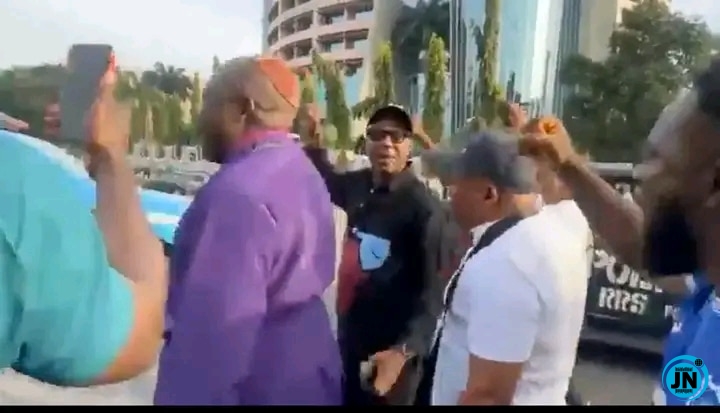An Igbo lady has sparked outrage and widespread debate on social media after boldly declaring that she does not pray for the release of Nnamdi Kanu, the detained leader of the Indigenous People of Biafra (IPOB). Her statement has drawn intense criticism from many Nigerians, especially those sympathetic to the Biafran cause.
The lady, identified on X (formerly Twitter) as Her Excellency (Ada), made the controversial comment while responding to the ongoing nationwide discussion about Kanu’s detention. Despite proudly identifying as Igbo, Ada stated that she fully supports the continued detention of the IPOB leader, claiming her position stems from personal conviction rather than tribal loyalty.

Her Comment Came After Sowore’s Abuja Protest
Ada’s remarks came shortly after the police clashed with protesters during the #FreeNnamdiKanuNow demonstration held in Abuja. The protest, spearheaded by activist and politician Omoyele Sowore, was aimed at pressuring the federal government to release the detained Biafran leader. However, the protest quickly turned chaotic when security operatives reportedly fired tear gas to disperse the crowd, leading to the arrest of several participants, including Kanu’s lawyer Aloy Ejimakor and his brother.
Ada, reacting to the event, criticized Sowore’s involvement, accusing him of using the protest for publicity. She insisted that the Igbo people did not authorize him to act on their behalf, implying that the protest was unnecessary and politically motivated.
“Sowore Is Desperate for Attention” — Ada Alleges
In her words, Ada wrote on her X handle: “Sowore is just one who is desperate for attention. The Igbos on Facebook are laughing at him because we did not send him message.”
She went on to add: “I’m proudly Igbo and I don’t pray they ever release Nnamdi Kalu.”

Mixed Reactions Trail Her Statement
Ada’s post immediately ignited heated reactions online. While some users defended her right to personal opinion, the majority condemned her stance as insensitive, calling it a betrayal of her ethnic roots. Many Nigerians viewed her comment as an attempt to downplay the prolonged detention of the IPOB leader, who has remained in custody despite several court orders demanding his release.
Ikuku wrote: “You speak for yourself and are entitled to your opinion, but you don’t speak for the Igbo people.”
Chiukwujioke added: “I don’t support Sowore either, but still, Nnamdi Kanu should be released. Justice delayed is justice denied.”
Fodio responded angrily: “Keep quiet! Every Igbo man wants MNK released except those who have sold their conscience. You’ve just revealed where you belong.”
Chiazoka Ibe commented sarcastically: “Post your NIN for confirmation. Anyone can claim to be Igbo online just to stir trouble.”
Araba added: “Shame to the Igbo people! Other tribes defend their own no matter their faults, but the Igbo trade theirs for social media clout.”
Innocent John also chimed in: “Your prayers don’t count; millions are praying for Mazi Nnamdi Kanu every day. He will be free soon.”
Chidike Udeh offered a balanced take, saying: “Let’s not be emotional. Whether you support IPOB or not, the man’s detention violates court orders. The conversation should be about justice, not sentiment.”
Nationwide Online Debate
Since Ada’s comments went viral, Nigerians across different social media platforms have continued to debate her statement. Some users applauded her courage for speaking her mind despite public backlash, while others accused her of being an attention seeker trying to gain followers through controversy.
The conversation has also reignited the broader discussion about freedom of expression, ethnic loyalty, and the political tension surrounding the IPOB movement. Many observers believe Ada’s comment reflects the growing divide within the Igbo community on how best to handle Nnamdi Kanu’s case — whether through activism, diplomacy, or silence.
As the debate rages on, both supporters and critics of Ada’s statement agree on one thing — her comment has once again brought the issue of Nnamdi Kanu’s continued detention back to the center of Nigeria’s political and social discourse.